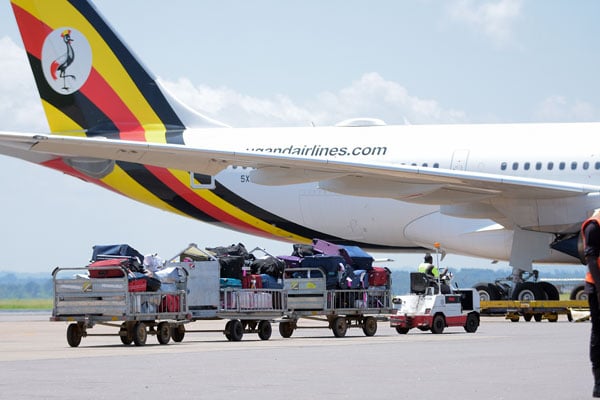
Mr Allan Kilavuka, the chief executive officer at Kenya Airways. PHOTO/Business Daily
Prosper
Prime
Airlines need professional managers, says KQ’s Kilavuka
What you need to know:
Kenya Airways registered a profit for the first time in six years. In an interview with Prosper magazine’s Deogratius Wamala, Kenya Airways chief executive officer Allan Kilavuka, explains how the airline’s restructuring process brought in efficiency and led to its operating profit this year.
What drives leadership in the airlines business?
Aviation needs to be understood as a catalyst for economic development, not just in East Africa but globally. In many developed countries, aviation is central to economic development in four main areas.
One, because of the continuous movement of goods and people, it requires a lot of labour and capital investment. For example, for one aircraft to depart, you need about 100 people around it whether engineers, cabin crew, pilots, or catering.
Secondly, countries that depend on tourism for economic development and bring in foreign currency, aviation is very key to this. For example, most of the tourists that come to East Africa are not from within. Most of them come from the Western nations, requiring a flight into the country because of the distance.
Thirdly, when it comes to cargo, exporting agricultural products. In Uganda, one of the biggest sources of foreign exchange is coffee and horticulture in Kenya. So for these commodities to reach Europe fresh, they need to be flown there and sometimes fly things back like electronics.
Airlines in the region are struggling to break even. They are putting in more operating expenses and are prone to foreign exchange losses. In this kind of environment, how can they increase their cash flows and reduce their expenses?
Operating aviation in Africa is extremely expensive in many aspects. But the two most important ones are the taxes that are levied on aviation, which are at least 45 percent higher than in many other places in the world because aviation is seen as a luxury and a kind of elitist industry.
Those costs and charges need to come down and Africa is seen as risky to do business in. For example, most airlines lease aircraft or even buy them. When you buy an aircraft and you are an African airline, you are charged a premium because of the perceived risk.
The same thing happens when you lease an aircraft or buy a spare part. So the challenges that we face are structural. There are structurally higher costs of doing business in Africa.
And, if you have a deficit in infrastructure, for example, if airports are deficient, you become inefficient. So, the costs become higher.
However, we also impose our own problems. Airlines need to operate with professional managers and with few political interference as possible. The moment you interfere politically with an airline, you reduce efficiency.
Because decisions are made not on commercial viability but political experience. Like travels abroad even though it’s hurting the aircraft’s operating costs. If you decide to do it from political experience, then you need to subsidise the airline to do that.
The bigger the airline the easier it is to absorb costs. Uganda Airlines and Kenya Airways are very small airlines by global standards. We need to scale. That is why I advocate for consolidation -coming together as airlines so that you negotiate better rate as you become a bigger group, and share fixed costs.
How can airlines in the region operate efficiently without being affected by foreign exchange losses which dented KQ financials, and Uganda Airlines?
These are foreign exchange losses due to the depreciation of the Kenyan shilling or the Ugandan shilling. These currencies are depreciating because of the economy.
Depreciation is just a symptom: We need to understand the cause. The stronger African economies are, the less they suffer from depreciation. If they are exporting more, for example, than they are importing, and they are exporting value-added products, then these depreciations will happen less. We need strong economies because we suffer from economic shocks.
Something happens in Ukraine and affects us. We have an imbalanced economy where you have more imports than exports, which puts more demand on the dollar than your currency.
Those things need to be balanced. When you have a more balanced export-led economy, it strengthens your economy so that you don’t suffer the shocks.
That is the problem. If we did not have that problem, then we would not have forex losses. You also need to increase the size of your fleet. Airlines take a lot of loans that are dominated by dollars. Therefore, this currency needs to be available because you are buying US-dominated assets like aircraft and many others.
If the economy is weak and you don’t have enough foreign currency in the country, then the currency depreciation will continue irrespective of what you do as an airline.
The trading of KQ was paused on Uganda Securities Exchange. Is it still on, why?
The trading of KQ was stopped during the Covid-19 pandemic depth of 2020, and it is still suspended. It was not suspended because financials were bad, but because it is restructuring and there was a lot of speculation on the shares. We did not want the speculation to continue because the stock is the real value of the airline. Because we are thinking of doing a major transaction by inviting an investor, we decided that it is best to suspend, go ahead with the restructuring and the transaction, and after that, we can reopen the trading on the counter.
We have not finished the transaction, so we are going to continue by June or September of next year, after which we can reopen.
Aren’t you scared about the smaller airlines taking up your routes when you scale down operations?
There is no airline in Africa that is big. The big airlines have 800 aircraft plus, or at least 300. The bigger the airline, the more sustainable it is, the smaller it is, the more vulnerable it is. So, smaller airlines are more likely to fail than big ones.
Airlines like Delta are like a combination of airlines; so is United, and America. They are a combination of several airlines in America, like AIG, which runs British Airways.
Airlines that are forward-thinking have realised that it is better to have large operating airlines that share costs and make it easier and more sustainable for them than small ones. But it depends on the role of the small ones. Yes, you can start a small airline and have a niche like safari travel only and charge very expensively.
Low-cost carriers, especially outside Kenya, have still not been accepted because people who travel still think it should be luxurious. We tried to introduce it in Kampala, but it did not pick up, so we withdrew. We are strategising to see how we can come back to the market and introduce this product again because people who travel between these two cities still appreciate full-service airlines.
Kenya Airways registered a profit for the first time after so many losses. What explains the turnaround?
We went through a restructuring process where we looked at new networks, frequency and schedules. We followed that so that we approach most commercially viable destinations. We removed all excess routes.
We then looked at operational inefficiencies basically on time performance. If we have delayed or canceled flights, it is very expensive for the airline. So we made sure we have that so that we bring efficiency.
We then worked on customer experience in the customer journey. From when they want to fly to the point that they land.




